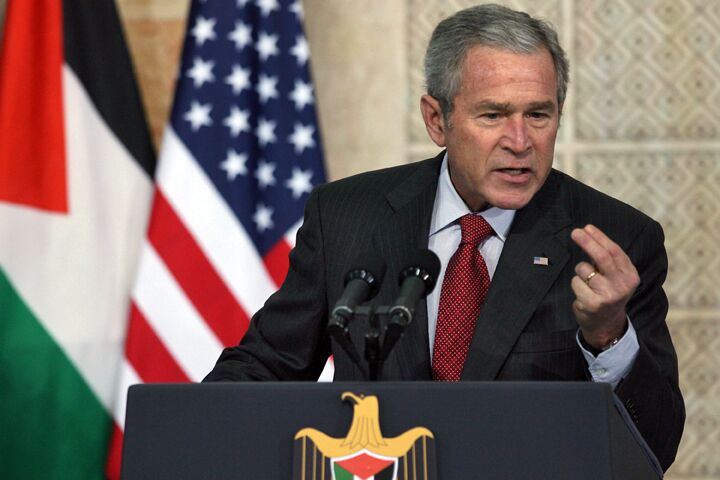
Why the U.S. President Lacks Credibility in Mideast
“Iran is a threat to world peace,” United States President George Bush told a press conference in Jerusalem last Wednesday. “Iran is a threat, and Iran will be a threat if the international community does not come together and prevent that nation from the development of the know-how to build a nuclear weapon,” he said.
With only 12 months left in his presidency, Bush is zealously traversing the Middle East in an attempt to create peace between the Israelis and the Palestinians and to curtail Iran’s aggressive ambitions. He made some of his strongest comments yet against Iran during his visit to Jerusalem. Then he set out for Kuwait, the United Arab Emirates and Saudi Arabia on a diplomatic mission to encourage these states to reach out to Israel and beware of Iran.
None of this tough rhetoric seems to be working, however. The fact is, no matter how hard a stance the president takes, the prospect of a soon-coming administration change and December’s National Intelligence Estimate (nie) have gutted his credibility.
Kuwait officials may have welcomed Bush into their country, but they made it clear that their country will not be used as a military launchpad into Iran as it was in the 2003 invasion of Iraq. The reason for this is best echoed in a prayer made by a senior Iranian cleric on Friday: “We hope some Arab countries have the wisdom not to tie their fate to a pathetic and bankrupt president who will be finished in a year … our neighbours know a powerful Iran will be their best friend.”
The Gulf states are concerned about Iran’s rise to power but realize that when Bush leaves office in 12 months, America’s Middle Eastern presence is highly likely to decrease. Iran will then be the dominant power in the region. They consider it in their best interest to smile and greet Mr. Bush for the duration of his visit, while not straying too far from Iran’s good side. It is like retired Egyptian Maj. Gen. Gamal Mazloum said last September, “Iran plays a key role in the region, whether we agreed to it or not.”
The other factor undermining Bush’s warnings about Iran is December’s nie. This report claimed that Iran halted its nuclear weapons program in 2003 and that Iran’s current nuclear program is for peaceful purposes only. As the Trumpet has reported, “It [the nie] single-handedly eliminated any rationale for military action against Iran, and even deflated the prospect of more sanctions.” Bush himself said in his Jerusalem press conference that he thought the nie sent the signal to some that “the United States does not view an Iran with a nuclear weapon as a serious problem.”
Not only are the Gulf states not taking Bush seriously, but vast portions of his own nation do not believe Iran is a danger. Democratic presidential candidate John Edwards and other anti-war politicians have come down strong criticizing Bush for warmongering. A Democratic Congress and a liberal media have had their part in undermining the credibility of any statements regarding an Iranian threat.
“A country which once had a secret program can easily restart a secret program,” Bush said in Jerusalem. Such a “restart” would not be unprecedented. The initiation of Russia, Pakistan, India and North Korea into the world’s nuclear club all took the U.S. by surprise. And all these nations gave far less warning than Iran has. Ahmadinejad is not only continuing to enrich uranium, he is expanding Iran’s enrichment facilities several times over. How long does it take to make an atomic bomb once a country has a stockpile of enriched uranium?
The United States is strengthening its commitment to Gulf states and “rallying friends around the world to confront this danger [Iran] before it is too late,” President Bush declared in Abu Dhabi on Sunday.
Though Mideast states will be happy to accept what amounts to U.S. bribes—arms deals—how seriously will they take President Bush in light of his virtual lame-duck presidency and the nie, which Bush has not repudiated, that effectively says Iran is not a threat?
Perhaps an editorial in Saturday’s Arab News, a Saudi English-language newspaper, sums up how the Arabs feel: “No Palestinian, no Arab believes he will, or can, deliver,” the editorial said. “Everything he touches turns to dust and ashes. Iraq, Afghanistan—maybe now even Iran.”
Moreover, President Bush’s tough rhetoric against Iran rings a bit hollow when the U.S. is at the same time negotiating with Iran to create a solution for Iraq. In addition to numerous private talks between the U.S. and Iran, the two parties have conducted several rounds of public talks. Just last month, Bush said that Iran’s behavior had improved and that talks with Tehran were producing results.
Watch for the U.S. to continue to shrink from its role as a check on Iran, despite the rhetoric. As a result, Iran will grow in power as the heavyweight in the Middle East. Read “Handing the Middle East to Iran” for more on this subject.
